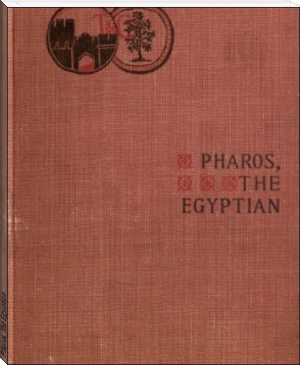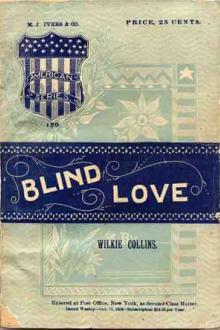Pharos, The Egyptian - Guy Boothby (motivational novels .TXT) 📗

- Author: Guy Boothby
Book online «Pharos, The Egyptian - Guy Boothby (motivational novels .TXT) 📗». Author Guy Boothby
"Now Ptahmes, who, as I have said, was an astute man, and who had already been allowed to see the consequences of giving advice that did not tally with his master's humour, found himself in a position, not only of difficulty, but also of some danger. Either he must declare himself openly in favour of letting the Hebrews go, and once more run the risk of Pharaoh's anger and possible loss of favour, or he must side with his master, and, having done so, put forth every effort to prevent the punishment Moses had decreed. After hours of suspense and overwhelming anxiety he adopted the latter course. Having taken counsel with his fellow-Magicians, he assured Pharaoh, on the honour of the gods, that what the Israelite had predicted could never come to pass. Fortified with this promise, Pharaoh once more refused to permit the strangers to leave the land. As a result the first-born son of the King, the child whom he loved better than his kingdom, sickened of a mysterious disease and died that night, as did the first-born of all the Egyptians, rich and poor alike. In the words of your own Bible, 'There was a great cry in Egypt; for there was not a house where there was not one dead.' Then Pharaoh's hatred was bitter against his advisers, and he determined that Ptahmes in particular should die. He sought him with the intention of killing him, but the Magician had received timely warning and had escaped into the mountains, where he hid himself for many months. Little by little his health gave way, he grew weaker, and in the fiftieth year of his life Osiris claimed him for his own. It was said at the time that for the sin he had caused Pharaoh to do, and the misery he had brought upon the land of Egypt, and swearing falsely in the name of the gods, he had been cursed with perpetual life. This, however, could not have been so, seeing that he died in the mountains, and that his mummy was buried in the tomb whence your father took it. Such is the story of Ptahmes, the beloved of Ptah, son of Netruhotep, Chief of the Magicians and Prophet of the North and South."
CHAPTER XII.
Strange as it may seem, all the circumstances attending it being taken into consideration, that voyage up the Nile was one of the most enjoyable I have ever undertaken. It is true the weather was somewhat warmer than was altogether agreeable; but if you visit Egypt at midsummer you must be prepared for a little discomfort in that respect. From the moment of rising until it was time to retire at night our time was spent under the awning on deck, reading, conversing, and watching the scenery on either bank, and on my part in putting the finishing touches to the picture I had commenced the afternoon we left Cairo.
When it was completed to my satisfaction, which was on the seventh day of our voyage, and that upon which we expected to reach Luxor, I showed it to Pharos. He examined it carefully, and it was some time before he offered an opinion upon it.
"I will pay you the compliment of saying I consider it a striking example of your art," he said, when he did speak. "At the same time, I must confess it puzzles me. I do not understand whence you drew your inspiration. There are things in this picture, important details in the dress and architecture, that I feel convinced have never been seen by this century. How, therefore, you could have known them passes my comprehension."
"I have already told you that that picture represents what I saw in my vision," I answered.
"You still believe that you saw a vision then?" he asked, with a return to his old sneering habit, as he picked the monkey up and began to stroke his ears.
"I shall always do so," I answered. "Nothing will ever shake my belief in that."
At this moment the Fraeulein Valerie joined us, whereupon Pharos handed her the picture and asked for her opinion upon it. She examined it carefully, while I waited with some anxiety for her criticism.
"It is very clever," she said, still looking at it, "and beautifully painted; but, if you will let me say so, I do not know that I altogether like it. There is something about it that I do not understand. And see, you have given the central figure Monsieur Pharos's face."
She looked up at me as if to inquire the reason of this likeness, after which we both glanced at Pharos, who was seated before us, wrapped as usual in his heavy rug, with the monkey, Pehtes, peering out from his invariable hiding-place beneath his master's coat. For the moment I did not know what answer to return. To have told her in the broad light of day, with the prosaic mud-banks of the Nile on either hand, and the Egyptian sailors washing paint-work at the farther end of the deck, that in my vision I had been convinced that Pharos and Ptahmes were one and the same person, would have been too absurd. Pharos, however, relieved me of the necessity of saying anything by replying for me.
"Mr. Forrester has done me great honour, my dear," he said gaily, "in choosing my features for the central figure. I had no idea that my unfortunate person was capable of such dramatic effect.--If at any time, Forrester, you should desire to dispose of that picture, I shall be delighted to take it off your hands."
"You may have it now," I answered. "If you think it worthy of your acceptance, I will gladly give it you. To tell the truth, I myself, like the Fraeulein here, am a little afraid of it, though why I should be, seeing that it is my own work, Heaven only knows."
"As you say, Heaven only knows," returned Pharos solemnly, and then making the excuse that he would put the picture in a place of safety, he left us and went to his cabin, Pehtes hopping along the deck behind him.
For some time after he had left us the Fraeulein and I sat silent. The afternoon was breathless, and even our progress through the water raised no breeze. We were passing the town of Keneh at the time, a miserable collection of buildings of the usual Nile type, and famous only as being a rallying place for Mecca pilgrims, and for the Kulal and Ballas (water-bottles), which bear its name.
While her eyes were fixed upon it I was permitted an opportunity of studying my companion's countenance. I noted the proud poise of her head, and the luxuriance of the hair coiled so gracefully above it. She was a queen among women, as I had so often told myself; one whom any man might be proud to love, and then I added, as another thought struck me, one for whom the man she loved might willingly lay down his life. That I loved her with a sincerity and devotion greater than I had ever felt for any other human being, I was fully aware by this time. If the truth must be told, I believe I had loved her from the moment I first saw her face. But was it possible that she could love me?
"I have noticed that you are very thoughtful to-day, Fraeulein," I said, as the steamer dropped the town behind her and continued her journey up stream in a somewhat more westerly direction.
"Have I not good reason to be?" she answered. "You must remember I have made this journey before."
"But why should that produce such an effect upon you?" I asked. "To me it is a pleasure that has not yet begun to pall, and as you will, I am sure, admit, Pharos has proved a most thoughtful





Comments (0)